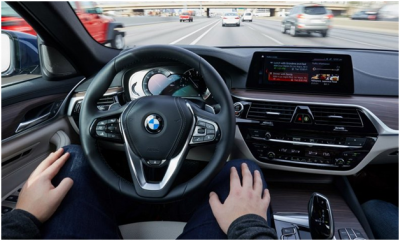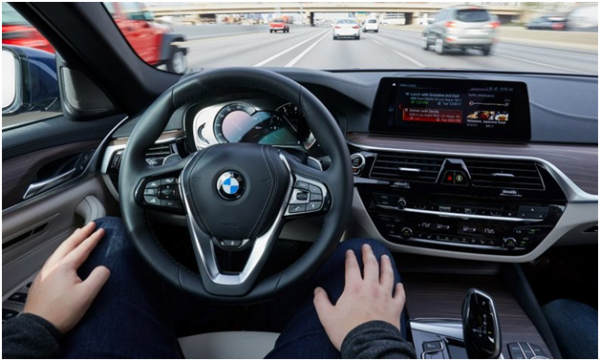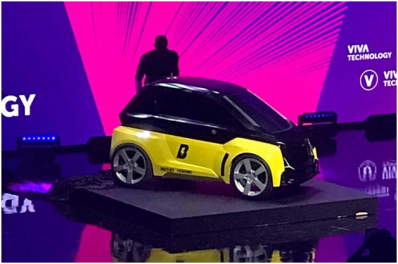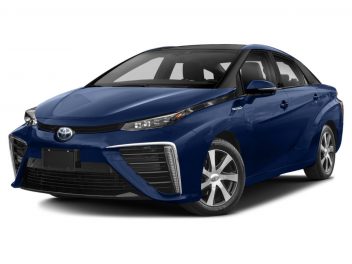By PETER SIGAL – Automotive News
May 16, 2019 – A majority of consumers have a positive attitude toward self-driving cars, and are awaiting their introduction with “anticipation,” a survey by the consulting group Capgemini has found.
The survey, of more than 5,500 consumers and 280 automotive executives, seeks to understand consumer expectations and how automakers are responding to them. Among its findings: consumers trust established automakers more than startups to offer safe and reliable self-driving cars, and they are more optimistic than auto executives about overcoming the challenges and barriers to autonomous driving.
“It’s not just safety and the technical aspects of autonomous cars that will determine their adoption rate — it’s also the consumer experience,” said Markus Winkler, vice president, global head of automotive at Capgemini Consulting, in an interview.
Winkler said that engineers and researchers needed to work hand-in-hand with marketers and user-experience experts to create self-driving cars that serve customers’ needs. “The consumer has to be brought back into the boat of this discussion,” he said. “They expect to be safely transported, but they also expect the convenience and the customer experience that autonomous driving is promising them.”
According to the survey, among those expectations are that self-driving cars will save time — around six and a half hours a week, which 63 percent said they would use to socialize with friends or family in the vehicle, either online or face to face. (Forty-five percent said they would use the time to catch up on their sleep.)
Expectations tempered
The survey comes at a critical moment for self-driving vehicles. Some automakers are saying that earlier predictions of their adoption were too optimistic, and that it will be many years before they are in widespread use. Several high-profile accidents and incidents of vandalism have also dulled some of the enthusiasm.
“We overestimated the arrival of autonomous vehicles,” Ford CEO Jim Hackett said last month. Hackett said that Ford, which is investing $4 billion in autonomous vehicles, still expects to offer its first self-driving car in 2021, but that “its applications will be narrow, what we call geo-fenced, because the problem is so complex.”
Studies have found varying degrees of enthusiasm for self-driving cars, with responses often dependent on how questions are worded. A Pew Researchstudy in October 2017 found, for instance, that 53 percent of Americans surveyed said that self-driving cars made them feel “very” or “somewhat” worried.
The Capgemini study captures some of that ambivalence and illustrates the challenges ahead. Asked what emotion describes how they felt about self-driving cars, 59 percent said “anticipation” and 52 percent said “surprise” — but 48 percent said “fear” and 43 percent said “loss of control/helplessness.” And just 32 percent said “trust” and 28 percent said “confidence.” (On the plus side, only 6 percent said “anger.”)
“The consumer is very influenced by what’s in the media,” Winkler noted. “You have peaks of excitement when an announcement comes out at events like CES, but at the same time, accidents and other incidents also affect the consumer.”
Nonetheless, automakers and startups are pushing ahead with the technology. Waymo, the autonomous vehicle affiliate of Google, which has been conducting consumer tests in Arizona, announced last month that it would retrofit an American Axle factory in Detroit to produce self-driving cars based on Fiat Chrysler and Jaguar models.
Bosch, the world’s largest automotive supplier, is teaming with Daimler on a pilot program in California this year, and will spend $4.6 billion on the technology by 2022.
The Capgemini survey focused on private ownership of self-driving cars rather than mobility services. Some automotive executives, including PSA Group CEO Carlos Tavares, have said that fully self-driving cars — so-called Level 4 and 5, which operate with no expectation of driver involvement at all — could be too expensive for private ownership.
Winkler said there would be a place for privately owned self-driving cars. “I think we’ll actually see a mix of consumers who are sharing and a high percentage who are not sharing, especially around premium cars,” he said. “It will be a different experience.”
Other key findings of the report:
- Auto executives and consumers view self-driving cars very differently. Three in five executives believe that learning how to drive a self-driving car will be a major barrier to adoption, but just 37 percent of consumers agreed. That gap could create a beneficial “trust dividend” for automakers, Capgemini says.
- There are areas where auto companies should focus in building greater consumer trust. These include aspects such as vehicle security and safety, which are top concerns for consumers, with more than 70 percent citing them as potential barriers.
- Feelings about autonomous cars vary by country and region, with Chinese having the most positive views, and Britons the most skeptical. Winkler attributed that to China’s widespread adoption of all-encompassing platforms like WeChat and Alibaba.
- Consumers are willing to pay more for autonomous cars. More than half (56 percent) said they would pay a premium of up to 20 percent.
- The outlook will grow more positive over time, with just 25 percent saying they would prefer to ride in a self-driving car now, but 52 percent saying they would do so in five years’ time.
- Of the earliest adopters, 63 percent are male, 68 percent are urban dwellers and 63 percent are age 35 or younger.
Capgemini suggests that automakers can speed up adoption rates and ease the transition to self-driving by keeping customers informed of developments, seeking to understand their needs and reassure them, building an ecosystem of services with companies such as Disney, and focus internally on software competencies.
“There isn’t really a standard or definition of what makes better autonomous driving,” Winkler said. “This makes it very hard to be distinctive with your brand, which means you really have to pay attention to what the consumer wants.”








